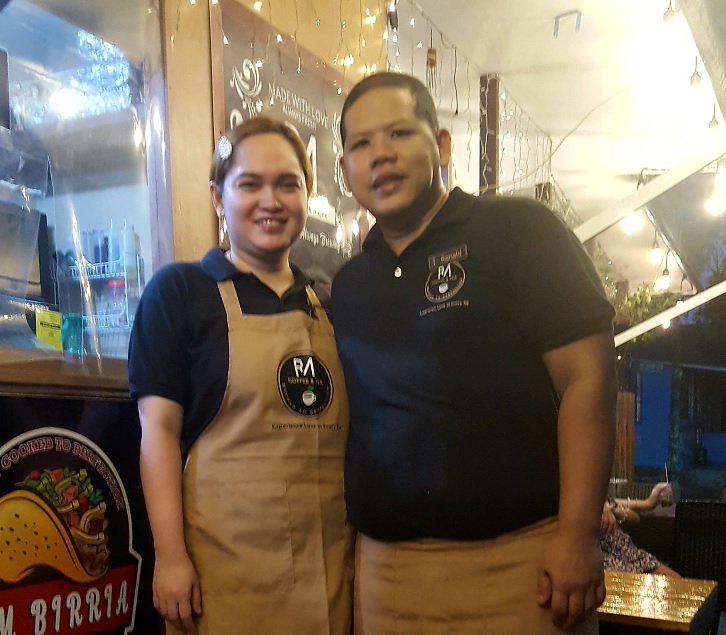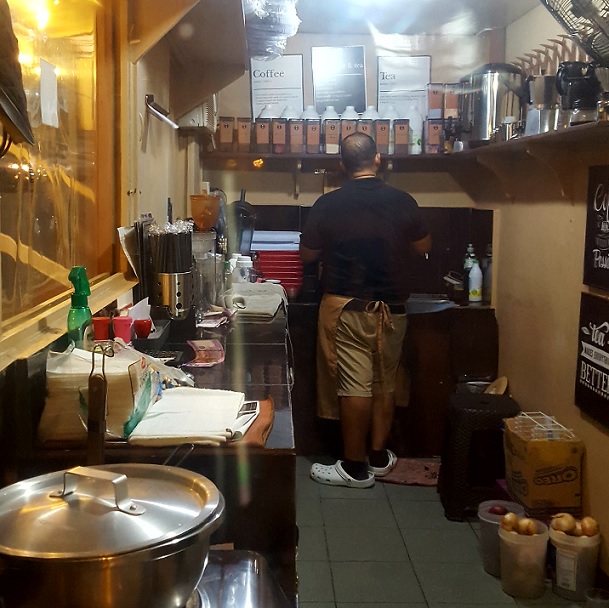Ronaldo Mariano is hands-on when it comes to RM Coffee and Tea — his café on J. Erastain Street in Kamuning, Quezon City. He conceptualized the menu and the café decor, does the marketing, and takes charge of the kitchen, but is helped by his wife Princess in managing the order counter.
The café sits on a corner lot, easily spotted by its color-coordinated facade, tables and chairs, and fence, all done in caramel brown, when you’re out and about on a hot, lazy afternoon. It becomes a beacon in the evening for motorists and pedestrians with the string of lights hung around it illuminating the street. It turns into a mini-Christmas display with the added stage laser lights that “dance” to holiday tunes emanating from a speaker.

Mariano, a former chef in a cruise ship, opened RM Coffee and Tea in July 2021, when pandemic protocols were being eased. He came upon the idea while looking for another way to make a living, having closed down his seafood supplier business. To get it off the ground, he built his barista skills on his own, plunging deep into research and countless hours of practice brewing coffee and tea in his condo unit during the lockdown.
He had meant to set it up on another street in Quezon City, but he found the business landscape there bleak. “You’re in business to earn money, not lose it,” he said. “My calculations told me I needed to sell 30 cups a day to make a profit, but if I’m just earning P500, I’d rather work in an office.”
He considered his parents’ old place, where his older brother had tried to make a go of a small grill restaurant years ago. His parents agreed to his proposed café, and he immediately fixed it up with P70, 000 he’d set aside. The café is an homage to his parents Ronaldo and Marina — “the most important people in my life” — hence RM Coffee and Tea.
Locked down
Mariano is among the entrepreneurs that went head-to-head with the health crisis that tested the Filipino grit. As Covid-19 ravaged the Philippines, an average of 73.1 percent of micro, small, and medium-sized enterprises (MSMEs) in the National Capital Region and high-risk areas were forced to close shop during the strict lockdown imposed from mid-March to the end of May 2020. This included the restaurants he supplied seafood to. MSMEs continued to “confront a sharp drop in demand and revenue six months after the lockdown,” wrote Shigehiro Shinozaki and Lakshman N. Rao in their paper, “Covid-19 impact on micro, small, and medium-sized enterprises under the lockdown: Evidence from a rapid survey in the Philippines,” published by the Asian Development Bank (ADB) Institute in February 2021.
Medium-sized firms encountered delays in delivery of products and services, and disruption in the supply chains, while small firms faced a sharp drop in domestic demands. Given this, no sales were registered in March 2020 for 59.9 percent of micro enterprises, 44.48 percent of small firms, and 35.8 percent of medium-sized firms. Similarly, revenue was in the red for 61.7 percent of micro enterprises, 49.1 percent of small firms, and 35.8 percent medium-sized firms in the same period.
Unexpectedly, however, some MSMEs experienced better business during the pandemic than in the pre-pandemic period owing to the spike in demand from households and firms for essential goods, services, and healthcare. Shinozaki and Rao said the “special demand…in retail trade offering daily goods and food” also had MSMEs offering such services enjoying increased sales.
A total of 2, 329 company respondents across the Philippines participated in ADB’s rapid survey, of whom 1, 804, or 77.5 percent, were from MSMEs. The survey was conducted from March 30 to April 16, 2020, online via Facebook and the networks of the Bureau of Small & Medium Enterprise Development under the Department of Trade and Industry and Philippine Chamber of Commerce and Industry.
Neighborhood café


So a customer crosses over to RM Coffee and Tea and collects his pre-ordered shawarma rice while I wait for my matcha milk tea. The people living next to the café pop in for ice-blended drinks before walking toward the main road. Inside, I hear a father on the phone with his wife explaining that he and junior were almost done with their shawarma pizza and would head home soon. (Junior was famished after his soccer practice.)
Mariano is in the kitchen Monday to Saturday, from 3 p.m. to 9 p.m., and does the marketing on Sunday at Nepa Q-mart on Edsa for the meat and vegetables, and the supermarket for other items. Nepa Q-mart is the practical choice for small food-business owners, he pointed out.
That he does the marketing himself, which he said he enjoys, helps keep the prices down, making his drinks and food affordable to the people in the neighborhood who have become regulars.
Customer care is the primary reason why he only takes orders onsite or through the café’s Facebook page. Otherwise, the scenario likely to unfold is that the orders of the food delivery systems will “jump the queue” because their orders have to be attended to immediately. With Messenger, he can ask customers if they’re willing to wait for their order. He’s the sole staffer, after all, and preparation takes a while.
Coming together
A silver lining was spotted in the dark business landscape with the rejuvenation of micro and small businesses operated by four out of 10 Filipino entrepreneurs, and the “new enterprises [gaining] considerable community support,” according to “Filipino entrepreneurship and the bayanihan spirit: The resurgence of micro and small businesses in the Philippines,” a report by Manulife Philippines released in February 2023.
The report said that one of the top reasons for Filipinos going into business was earning an income, followed by maintaining financial stability and providing convenience and accessibility to people. Most of the new businesses reflected the people’s needs at the height of the health crisis because 41 percent were in food and preparation and processing, 30 percent in retail, and 24 percent in delivery of essential goods and services.
A major push-factor in the huge patronage of local businesses was the Filipino bayanihan spirit, with 66 percent of respondents surveyed doing it to support the local economy and 63 percent to support the local community. Figures also indicated that 32 percent patronized the local businesses more than once a week, and that 51 percent were very likely to continue with their patronage of small businesses.
The report was conducted together with research firm InSites Consulting that polled 500 Filipinos aged 18 to 55 nationwide in May 2022.

Pinoy Taste
Mariano, a graduate of the Center for Culinary Art, Manila, clearly had a feel of the Filipino palate, knowing that hot drinks “aren’t that applicable to the Philippines” given the weather, compared to European countries where hot drinks chase the cold away.
“Filipinos like sweet, refreshing cold drinks, and this is why I concentrated on selling cold drinks. If you want to sell hot drinks like Starbucks, your place should be cold,” he explained.
RM Coffee and Tea initially started with 100 concoctions of ice-blended coffee, latte, milk tea, frappe, iced and fruit teas, lemonade, yogurt drinks, and smoothies. Mariano sources his coffee beans locally and gets his tea leaves from Taiwan and Thailand. The coffee drinks are hand-brewed — as opposed to machine-brewed — because owning an espresso machine is “expensive to maintain,” he said. His coffee-drinking friends helped test his concoctions; he added them to the menu if they gave him the thumbs-up.
Neighborhood residents suffering from cabin fever started to frequent RM Coffee and Tea because its al fresco setting gave them a place to enjoy its beverages — i.e., bestsellers like sea salt latte and Irish cream coffee, or matcha or rock salt and cream cheese milk tea.
Regrettably, the lifting of the lockdown pushed some of his regular customers to the malls that had opened and were operating at full capacity.
More choices
With the hubbub in the kitchen quieting down, Mariano thought of introducing food that went well with coffee and tea. Shawarma it was, but he didn’t stop at just offering the common shawarma dishes.
“If I only did shawarma rice and wrap, people would lose interest immediately,” he said.
He made the rounds of the shawarma houses, finding out how they made the dishes, and tweaked the recipes by “adding something different so people will come to my café.” RM Doner Kebab was launched in November 2021, and his shawarma sushi baked, shawarma baked lasagna, shawarma nachos, and shawarma quesadilla soon became bestsellers. In July 2022, he put the 10-inch, pita-dough-based RM Shawarma Pizza on the menu — an idea that stemmed from a craving for pizza one afternoon. His customers quickly ticked off the variants as their favorites: All-meat, RM Supreme, RM Special, Creamy Spinach and cream cheese, and 5-cheese. By the end of 2022, he had added RM Birria, or Mexican tacos.
“There are a lot of items on the menu because Pinoys lose interest quickly. They like having a lot of choices,” said Mariano, the youngest of three brothers.
Almost two years have passed since Mariano added food to his coffee-and-tea menu. It was a successful gamble, pulling back the old customers and attracting new ones.
It’s usually on warm days when I order my milk tea, and the scene is an encore of when I last dropped in, with Mariano in the kitchen and Princess taking orders. This time there’s a group of women who are halfway through their shawarma rice and coffee drinks. A driver pulls up and orders shawarma nachos and iced coffee to go.
A woman is at the counter. “How are you?! It’s been a while since I last saw you!” says Princess, handing over her ice-blended drink and shawarma pizza. All is good at the neighborhood café, with each day being a milk-tea-and-kebab kind of day.


